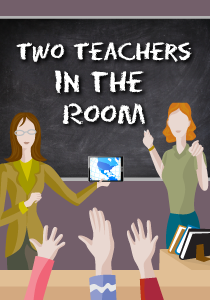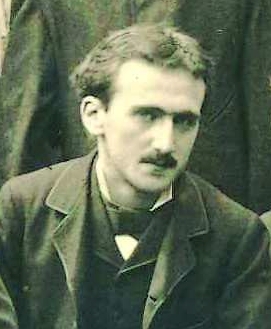Be a Vital Co-Teaching Force This Year!
A MiddleWeb Blog
 The excitement of another school year is upon us. Our clean slate – that fresh start – a renewed sense of making a difference in students’ lives – comes into a crystal clear, energizing focus.
The excitement of another school year is upon us. Our clean slate – that fresh start – a renewed sense of making a difference in students’ lives – comes into a crystal clear, energizing focus.
It’s the kind of feeling that is completely intangible – and so completely powerful.
In fact, if you really let yourself feel it, you will be left with that ready-to-take-on any challenge and embrace every task sense of confidence, commitment, and resilience.
As you can probably detect, this week’s post finds me feeling fairly philosophical as I think about my hopes for all co-teachers (and there are hundreds of thousands of us) this school year.
Philosophy meets co-teaching
According to a vitalistic approach (and Webster’s Dictionary), all living organisms are sustained by a vital force that is separate from any physical or chemical force. Those who believe in Vitalism embrace a self-evolving, self-determining nature.
Henri Bergson, an influential French philosopher in the 19th century, explored Vitalism in hopes of answering the question, Can we obtain knowledge of something as an absolute—as it actually is?
He wondered if knowledge went beyond just knowing about something based on someone’s perception and beliefs of knowing something as espoused by Immanuel Kant in his The Critique of Pure Reason. Kant believed that we can never really know something as it actually is. We can only know something as it is relative to one’s mind and personal perceptions.
Bergson’s enthusiastic response to Kant’s ideas were, Yes! We can indeed know something as an absolute. Bergson believed that we possess two kinds of knowledge:
- Relative Knowledge: Knowing something from a relative perspective gained from one’s intellect and reasoning.
- Absolute Knowledge: Knowing something as it actually is through an acquired sense of truth and intuition.
I just love spending time discussing philosophical theories as they pertain to our everyday interactions and reflections. And so, what does this have to do with co-teaching? Everything! We can stretch the views of Kant and Bergson to help us co-create the most vital and effective co-teaching experiences this year.
Ask yourself, How can Bergson’s view of two kinds of knowledge ignite your co-teaching experiences?
Two kinds of co-teaching knowledge
Co-teachers can translate Bergson’s view into direct, positive co-teaching moves.
It only takes one step to get you started – and then it’s about just letting the co-teaching energy flow.
That step: Each co-teacher should take a few minutes to make a list that summarizes your view of creating a successful co-teaching experience for you and your students through the dual lens of Bergson’s two types of knowledge.
Hints to spark your thinking
Relative Knowledge
Consider what your perspective is on a variety of co-teaching aspects ranging from classroom management to parent communication and instructional decisions. Now jot down your ideas.
- Value the perspective you hold – AND begin to become curious about what your co-teacher is thinking. Remember, if you allow the process to flow, you will broaden your perspective by valuing your co-teacher’s view on any aspect of co-teaching.
- Consider the valuable perspectives of your students, parents, etc. Jot down any thoughts that come to mind.
Absolute Knowledge
- Embrace your intuition – which Bergson identified as one’s vital force. It is our direct interactions with our world over time that allow us to activate our intuition as we capture the essence of whatever it is we are learning about. By combining our direct interactions with our world along with our intuition, we can gain this direct form of knowledge.
- Co-teachers can gain absolute knowledge through communicating their thoughts over time on a variety of topics that must be shared as absolute knowledge. For example, setting up a classroom learning environment – what things have you learned over time about the right environment for students that are now your absolutes?
- Jot down your non-negotiables when it comes to setting up your class routines, policies, and instructional decisions.
OK, that’s it! After a few minutes of creating this list, reread it to gain a firm grip on your co-teaching beliefs and hopes. Now you’re ready to let the year flow!
Share your list with your co-teacher. Maybe even make the time to meet for coffee and relax as you get to know one another better. Through this process you will be making the time to set a firm foundation for an effective co-teaching year.
Oh! And remember…
After discussing your view of your co-teaching absolute knowledge—BE FLEXIBLE! What has your co-teacher shared that just might shake things up (in the best way) in your teaching world?
Go back to your list and rethink your non-negotiables. Is there any place you could embrace another way of doing something? Revisit your lists and share by checking in with one another every few weeks and enjoy a co-creating a year to remember!
A co-teaching reality check
So here’s the place where I will insert a co-teaching reality check. Not every co-teaching pair is the solid “we’re so thrilled and honored to be working with each other!” pair. In fact, there will always be some potentially toxic co-teaching situations where at least one co-teacher is less than willing to make it work.
And that’s the beauty of Bergson’s two kinds of knowledge theory. As long as one of the co-teachers commits to being the vital force, that co-teacher will keep the co-teaching experience on track for doing what is best for creating a meaningful learning environment. Here’s how that might look.
Relative Knowledge on you own
Grasp your perspective and translate your beliefs into positive action steps. Reach out to other colleagues for support and collaboration. Share your thoughts online (in the comments section here for starters!) and gain a deeper perspective. Validate your perspective by valuing and embracing others’ views. Accept your co-teacher’s alternate viewpoint without judgment.
Do not waste your time and energy weighing in on something you cannot control. Instead, use your solid views and beliefs on what is right for your students as the mainstay for all you do. Communicate with your students, parents, other colleagues, and social media venues (join #Coteachat!) to strengthen your firm stance on creating meaningful learning experiences for your students.
And, of course, communicate with your co-teacher in productive ways to the greatest extent possible – never give up on that.
Absolute Knowledge on you own

So are you READY to be a vital force (or in some cases…the vital force?) in your co-teaching relationship this year? Yes! Be that teacher!
Here’s the place for you to add your questions, comments, ideas, and experiences. Let’s combine forces and make the positive energy transcend throughout this new co-teaching year – our students need us to make this commitment….


 Consider what your perspective is on a variety of co-teaching aspects ranging from classroom management to parent communication and instructional decisions. Now jot down your ideas.
Consider what your perspective is on a variety of co-teaching aspects ranging from classroom management to parent communication and instructional decisions. Now jot down your ideas.

































How can we be one and many at the same time? Symbiosis, Coevolution.
Bergson answered that question and 21st century biology confirms
Bergson’s intuition.